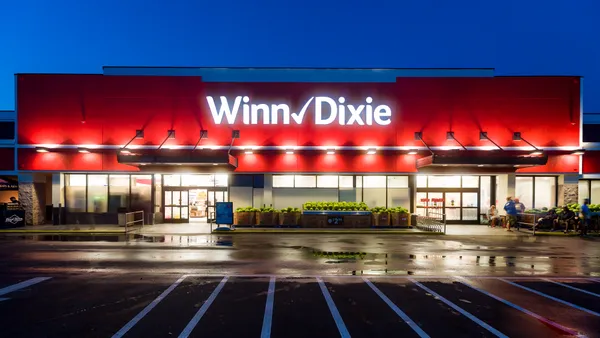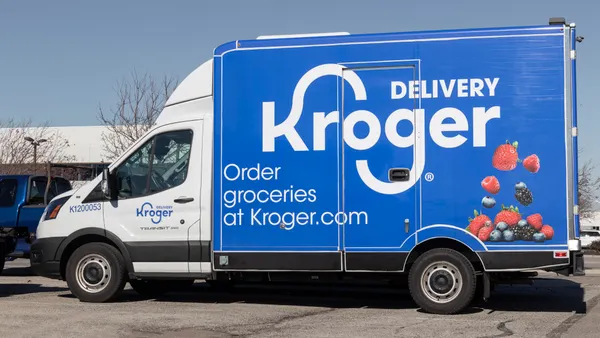Dive Brief:
-
Ahead of Walmart's annual investors meeting Tuesday morning, the company announced via a press release that it expects fiscal year 2020 U.S. comp sales to rise between 2.5% and 3%, and e-commerce net sales to grow by 35% (versus a 40% expected rise at the end of this year). Walmart expects sales growth to be at least 3% negatively affected by about 100 basis points because of the deconsolidation of Brazil operations and a reduction in tobacco sales at Sam's Club.
-
Walmart also updated its fiscal year 2019 GAAP and adjusted earnings per share guidance to include the expected 25 cents per share Flipkart dilution. Flipkart aside, Chief Financial Officer Bret Biggs repeatedly assured investors that the core business will grow steadily. Fiscal year 2020 EPS excluding Flipkart is expected to increase by a low to mid-single digit percentage range.
- CEO Doug McMillon said the company's grocery pickup program has been a key customer acquisition tool for the company. “We scaled from nothing in 2014 to 2,000 locations today and consistently deliver the highest net promoter scores our company has ever seen,” he said. “Having fresh food within 10 miles of 90% of the U.S. population is a structural competitive advantage that we are leveraging.” Walmart is also building out home delivery, with plans to reach 40% of U.S. households by the end of this year.
Dive Insight:
"We see the big picture as it relates to an emerging retail business model that operates as an ecosystem," Walmart CEO Doug McMillon told investors Tuesday. He added that the kind of business model he envisions — one that hinges on better executing the fundamentals, innovating for the future and building a differentiated portfolio of brands — is anticipated to boost profitability.
During a half day event, executives expressed a changing mindset to investors — one that several noted as being purpose-driven. "I want to challenge your thinking of Walmart" McMillon said, adding a list of major tech initiatives the company has launched to automate mundane tasks, boost employee training and retention, and reducing its energy costs and footprint.
"We're solving problems differently and more quickly. Looking back, we had a proven model and focused on execution, but we unintentionally became risk averse. Today we're getting to reimagine retail and our business, to do that we have to take risks, try quite a few things and learn from our failures," he said. "That kind of behavior is in our DNA and we're waking up to that culture. There is a cultural change underway at Walmart, and we're enjoying it."
Walmart has become a much different company over the last two years since the acquisition of Jet.com and the aqui-hire of Marc Lore, president and CEO of U.S. eCommerce at Walmart. One of the companies key focus areas, McMillon said, is to "sharpen culture and become digital."
Since coming on board, Lore has collected a growing number of digitally native as well as specialty brands. While the former category (including the likes of Bonobos, Modcloth and Eloquii) brings millennial appeal, the latter (including brands like Bare Necessities, Moosejaw and Shoes.com) boost category expertise, he said.
"You're starting to see opportunity to create lots of partnerships. While no one on its own will make a difference on its own ... once you string these together it can and it will," he said. The way Lore sees the puck moving is toward same-day delivery. According to him, Walmart.com tripled two calendar day deliveries and knocked down variable cost per unit by 10%. By the end of the year, 40% of the population will have access to same-day delivery, and next year it will be available to 60% of the population.
Lore said the company is on track to achieve its anticipated 40% e-commerce growth target. And looking ahead, Walmart's digital business will be more personalized, be localized and emphasize pick up and same-day delivery, Lore added. Overall, executives expressed the need for Walmart to have a sense of urgency to get ahead.
That means going on offense. To Lore, initiatives like Store No. 8, which is currently incubating five companies (only two of which have been publicly announced), will keep Walmart thinking about long-term innovation. The companies that have been announced include Jetblack, a text-based delivery service piloting in New York City, and Spatialand, a virtual reality company that Lore envisions as a natural extension from conversational commerce.










